Tracing the origins
Chairman of the SLPI Institute Kumar Nadesan chaired the inaugural working session which kicked off with the President of the Editors’ Guild, Sinha Ratnatunga revisiting the Colombo Declaration of 1998 and giving the backdrop to that event. He said the Government of the day was on a witch-hunt against editors and publishers bringing serial indictments on criminal defamation charges against them. He said that publishers, editors, reporters and media activists then banded together to bring about organised resistance to the then Government's moves to suppress media freedom.
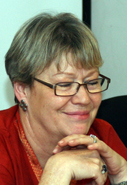 |
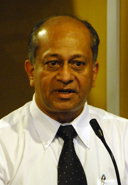 |
| Lindsay Ross |
Kumar Nadesan |
“There is no hidden agenda in the 10th anniversary sessions. The only agenda being to defend press freedom and to bring new laws through a bi-partisan approach that would make Sri Lanka a modern liberal democracy, and for her people to enjoy the benefits of the Information Age, Mr.Ratnatunga said.
Ms.Lindsay Ross, Executive Director of the Commonwealth Press Union (CPU) said that the signing of the original Colombo Declaration in 1998 was a remarkable achievement and became only the second country in the Commonwealth, after Ghana to abolish criminal defamation, a bad law that was in dis-use in the UK and most other democracies even though not abolished. She referred to the example set in self-regulation through the Press Complaints Commission which was now a study by other Commonwealth countries. “But we cannot remain complacent and (must?) continue with our commitment to preserving press freedom, social responsibility and responsible journalism,” she said, urging the new generation of journalists to carry forward the torch lit by their seniors.
Mr.Sanath Balasuriya of the Sri Lanka Working Journalists Association (SLWJA), the country’s largest media organisation said, the SLWJA endorsed the Colombo Declaration last year but there are several shortcomings that need to be remedied. “There are two important matters in my opinion. One is to convert the state media into the people’s media, and also to take action to safeguard media freedom as we can see that some of the rights we have won are being eroded one by one now,” he said.
Press freedom
President of the South Asian Free Media Association (SAFMA) Lakshman Gunasekera chaired the next session on Press Freedom in Sri Lanka with Head of the Media United of the Centre for Policy Alternatives (CPA) Sunanda Deshapriya, Member of International Media Support (IMS) Robert Shaw and Chairman –Sudaroli Publications E.Saravanapavan, the panelists.
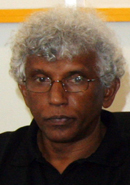 |
| Sunanda Deshapriya |
Mr.Saravanapavan said that real press freedom does not exist in Sri Lanka and cited the case of killings and attacks on journalist in the past few years particularly in the north and the east of the country with no one being punished for such crimes.Mr.Deshapriya said the last year saw the biggest campaigns for press freedom in the country and these have proved to be effective to some extent. “If we had not done what we did, the level of attacks on journalists would have increased. The two killings of journalists that have been reported this year we understand were carried out by the LTTE. So everyone is responsible for this situation,” he said. He also spoke on the need to improve working conditions for media personnel in the country. “There can be no press freedom existing in conditions of corruption, poverty and fear,” he added.
Mr.Shaw said the international media community has come together to put pressure on the Sri Lankan government to discharge its responsibilities with regards to ensuring press freedom and emphasized the importance of strong communication and solidarity between international and national networks to make this happen. He likened the situation in Sri Lanka to the conflict in Northern Ireland, which ultimately proved that through dialogue and support from the international community "there can be a way out and a way forward.”
Media and self
regulation
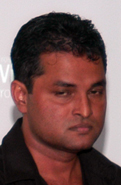 |
| Uvindu Kurukulasuriya |
Member of the Dispute Resolution Council, Press Complaints Commission of Sri Lanka (PCCSL) Jayathilake De Silva chaired the first day’s afternoon session on “Self-Regulation; ‘Policing the Media by the Media’ while Director, UK Press Complaints Commission Tom Toumlin, Convenor -Free Media Movement Uvindu Kurukulasuriya and Journalism Lecturer, Oslo University College Ms.Audgunn Oltedal were the panelists.
Mr.Toumlin said that journalists must make self regulation credible so that no room would be left for state interference in regulating the media. “The alternative to self regulation was state regulation. While politicians would love to regulate the media, it is up to the journalists to regulate themselves and not to give any conceivable excuse for the government to step in to regulate the press,” he said. He gave the audience some examples of how self-regulation was working in the UK, and despite, some instances of feet-dragging, there was general agreement among the media that this was a better option to state regulation.
Mr.Kurukulasuriya said that self regulation was a better alternative both to the readers as well as media organisations compared to the earlier system when complaints against the press were probed by the Sri Lanka Press Council. “Complainants had to retain lawyers to pursue a compliant against a newspaper, and it was a slow and tedious process. Self regulation is effective, saves time and saves money,” he said. Mr.Kurukulasuriya said that The New York Times carried 3400 corrections in 2007-- an average of ten a day.
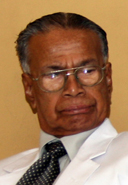 |
Sam Wijesinha: Distinguished
participant at the symposium |
He cited examples, where that prestigious newspaper even carried corrections on the way people spelt their name, or the colour of jersey of a hockey player.
“A newspaper does not lose its credibility by carrying corrections as is the general perception. It tells the reader that the newspaper is willing to correct itself when a mistake has been made and in turn enhances the reader’s faith in the publication,” he added.
Ms. Oltedal spoke of the systems of self regulation in Scandinavian countries through press complaint boards, which, in Norway, consists of four media representatives and three civilian representatives. She said the Norwegian PCC stands up for journalists of all political stripes, whether liberal or conservative.
The Norwegian system of self-regulation started even before the second world war, she said and was now ingrained in the Norwegian newspaper industry as part and parcel of professional journalism.
Contempt of Court
The session on Contempt of Court - ‘The need for a law on Contempt of Court’ was chaired by Executive Director of the Centre for Policy Alternatives (CPA) Dr. P.Saravanamuttu, Attorney-at-Law Kishali Pinto-Jayewardene, former Chief Justice, State of Karnataka, Justice Michael Saldanha, and Justice Shiranee Thilakawardena of the Supreme Court of Sri Lanka were the panelists.
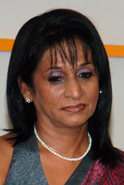 |
Justice Shiranee
Thilakawardena |
This discussion revolved around the provision in the 1998 Colombo Declaration calling for a Contempt of Court Act that would define the parameters under which journalists, and others, would know to operate. The call was for a definite definition on what is Contempt – and not for Contempt of Court to be totally excluded as part of the armoury of the Court.
Justice Thilakawardena began by saying that the Administration of Justice required a certain amount of respect from the public, were it to be effective. She cited some examples where the highest Court had been unfairly ridiculed, and referred in particular to the instance when there was a reference to “balu theendu’. “Journalists are the voice of the voiceless of any country”, she said and added that whatever proposed Contempt of Court Act was to be enacted, it should be inclusive, and for the benefit of everyone and not be one exclusively for journalists. She said that Sri Lankan Courts have not jailed a journalist for contempt of court.
Ms.Pinto-Jayawardene said that Sri Lanka should consider enacting a Contempt of Court Act and domestic pressure has been exerted by lobbying groups and civil society including the Bar Association of Sri Lanka and the Editor’s Guild over the past several years.” She referred to the Lakshman Kadirgamar All Party Select Committee that went into the need for such a law, which unfortunately was aborted with the premature dissolution of Parliament in 2004. The Sri Lanka law on contempt of court has effectively resulted in a “chilling” of the freedom of speech, expression and information on matters of public interest. What amounts to contempt of court has been subjected to differing interpretations by the court, the majority of which have inclined towards conservative views,” she said.
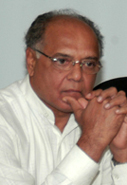 |
| Justice Saldanha |
Justice Saldanha said that when the judiciary "goes wrong, fair criticism must be allowed." Justice Saldanha argued that in order to insure the contempt of court laws are not arbitrarily used, there needs to be redrafts of all the laws in order to carefully build in safeguards for the freedom of speech. He pointed out to instances in India where such an Act existed and defined what the law was in so far as contempt of court was concerned.
During a somewhat stimulating inter-active session after the panelists had spoken, a journalist asked what specifically was the legal position with regard to any journalist having to divulge his or her source to Court. Would he or she be jailed for not doing so, he asked. Ms. Pinto Jayawardene referred to a judgment by Justice Mark Fernando which said that a journalist does not have to. Justice Thilakawardena agreed with this viewpoint, and added that it was “better for a journalist to court jail than divulge his or her source”.
Emergency regulations
Dr. Deepika Udagama, Head, Faculty of Law, University of Colombo chaired the discussion on emergency regulations. The first speaker, former Attorney General C.R. De Silva PC, said that emergency rule had been “plaguing” the country for a long time and outlined several of its legal aspects, including the inability of the judiciary to question the validity of emergency regulations and longer periods of detention for those suspected of threatening public safety.
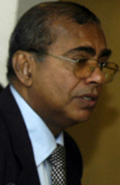 |
| C.R. De Silva |
Mr. De Silva also pointed out that although emergency rule allows for greater empowerment of the President during emergency rule, the executive branch is not endowed with unfettered powers by the Constitution. “There are checks and balances in the Constitution to deal with executive power,” he said.
Senior Researcher of the Legal Division of the CPA Asanga Welikala said that because emergency rule has been enforced for the better part of the last thirty years, the severe curtailment of free speech allowed under such rule has become the norm rather than the exception. In response to a question from the audience, Mr. Welikala, said that constitutional flaws coupled with unchecked powers of the President during emergency rule could be arguably called a “constitutional dictatorship.”
Dr. Udagama closed the session by saying that censorship today doesn’t necessarily come through “official” channels such as the law, but is enforced by indirect methods like violence and intimidation. Therefore, she argued, even introducing a Bill of Rights that adheres to international standards might result in little improvement in freedom of expression unless the general political culture in Sri Lanka is dramatically changed.
Reporting conflicts
Editor of The Sunday Island Manik De Silva moderated the panel on ‘Reporting Conflicts’ which covered a wide range of subjects such as the Sri Lankan media’s enormous challenges in accurately reporting on conflict in the country, the lack of sustained interest by the international community in the war, and whether or not, the fundamental role of the media should be as an objective observer or engaged critic. AFP Bureau Chief for Sri Lanka and the Maldives, Amal Jayasinghe said the government’s tight control over the flow of information contrasted with other governments around the world, many of whom practise a form of “news management” rather than news censorship. Mr. Jayasinghe who had just returned from a stint in covering the conflict in Iraq said that he started his day by wading through countless number of statements issued by the US Military on what was happening in that country.
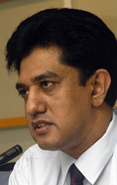 |
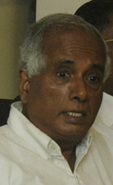 |
| Charith Herath |
Manik De Silva |
Consultant to the Ministry of Mass Media and Information Prof. Charith Herath said it is important for journalists to articulate their objectives when reporting on war. “Are they there to educate their readers or to sell a certain position on the war to them,” he said asking the audience to consider whether the media in Sri Lanka could offer “value-free” reporting.
Consultant Editor of The Sunday Times and CNN’s Colombo correspondent Iqbal Athas gave a history of conflict reporting since World War Two and the ways in which evolving technologies have influenced the role of the war correspondent. “The revolution in communications technology has confined the word ‘censorship’ to the dictionary,” said Athas, who also spoke of both, the inability to cover a conflict from the frontlines on the one hand, and the ‘over-load of information’ by official agencies, on the other which Mr. Jayasinghe had referred to earlier. During the question and answer period, several of the panelists spoke about the difficulties of reporting on a war that has lasted as long as Sri Lanka’s, when death and destruction is, by some definitions, no longer “news.” One foreign delegate said that it seemed ironic that the Sri Lankan Armed Forces were not taking journalists to the front if in fact they were winning the ‘war’ against the rebels.
New media
Senior Fellow at the University of Kelaniya Dr. D.B. Nihalsingha, chaired the panel on ‘New Media and New Challenges’ which focused on the need for legal action to protect the use of new technologies and the tension between “old’ forms of media, and emerging media platforms.
Executive Director of Learn Asia, and the former Director General of the Telecommunications Regulatory Commission Rohan Samarajeewa discussed the dramatic growth of mobile telephones and the Internet in Sri Lanka during the last decade, noting that when the Colombo Declaration was drafted in 1998, media websites were static and there were few broadband users. At that time, Sri Lanka was similar to what Myanmar is today, he said. Today, there are approximately 100,000 broadband users and eight million cell phone users in Sri Lanka. Prof. Samarajeewa specifically recommended that new drafts of the Colombo Declaration contain statements against government powers to shut down telecommunication networks.
Senior Researcher in the media unit of the CPA Sanjana Hattotuwa emphasized the need for mainstream media to treat citizen journalists as professional equals and for self-regulatory bodies such as the Press Complaints Commission to engage in dialogue with members of the new media. Mr. Hattotuwa also warned against government regulation of the Internet replacing the agency of individuals, arguing that the same technologies used, for example, in the protection of children from pornography can also be used to create the “Great Firewall of China” in Sri Lanka.
Right to Information
The panel on the session on ‘Right to Information’ was chaired by Professor of English, University of Peradeniya Dr. Arjuna Parakrama which examined the historical precedents for a Right to Information Act in Sri Lanka, the status of such, and the legal initiatives at this time., Director of Media Information and Communication Centre in New Delhi Ms. Nandini Sahai began her talk by showing a documentary on the genesis of the Right to Information (RIT) movement in India.
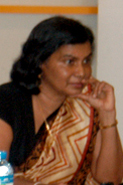 |
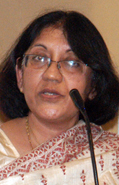 |
| Dhara Wijethilaka |
Nandini Sahai |
She said the movement began as a “fight for life and livelihood” among villagers in Rajasthan trying to curb corruption among local level politicians. She said that movement then enrolled the support of the Indian media, and now almost every state in India has such an Act, along with one at national level.
No longer can government projects be implemented without the right for people to ask questions. Going through the provisions of what she called was a ‘Right’ of the citizen, she said that any law sans a punishment clause (for not divulging the information required in a given period of time), would be worthless. Secretary to the Ministry of Plan Implementation and Member of the Law Commission of Sri Lanka, Ms. Dhara Wijethilaka spoke of the work done in 2004 (when Cabinet approved such a law) and thereafter (by the Law Commission) to prepare new legislation giving citizens the right to access official information, but pointed out that none of these had yet materialized. Senior Lecturer, Law Faculty, University of Colombo Rohan Edrisinha said that he believed the overall situation in Sri Lanka was arguably worse in terms of the RIT than in India because of the tremendous physical risk to journalists, lawyers, human rights activists, and the private sector actors who challenge the government. “I’m extremely pessimistic about any RIT Bill being passed here in the present context of things,” he said.
Dr. Parakrama disagreed with that pessimistic tone. During the discussion session, Justice Saldanha said that “even an imperfect law” was better than no law, and suggested that those pioneering this law in Sri Lanka try to get some law in place without waiting for a perfect law. He said that this was a law that was not just aimed at bringing powerful politicians to book, but was aimed at people at grass-root level questioning government in their small towns and villages.
Ms. Sahai said that there was a similar tone of pessimism in the Indian media until things began to happen, and now there is a Right to Information piece of legislation. Ms. Wijethilaka referred to the Courts as an institution from where citizens could get redress, and pointed out to the Declaration of Assets Law whereby details of the assets of parliamentarians are available. Asked what was happening to the Law Commission draft, she said they were now been considered by the line-ministries, viz., the Ministry of Justice and the Ministry of Media. Eventually, Rohan Edrisinha said they should then be encouraged by what the Indian participants had to say, and strive for lobbying for such a law in Sri Lanka, and Dr. Parakrama from the chair good humouredly said he was happy that Mr. Edrisinha was encouraged by what the Indian colleagues had to say, even though he had said the same thing himself.
Training journalists and trainers
The four day symposium ended with a session on Journalism Training which was chaired by the Director General of the SLPI, Ranga Kalansooriya who explained to the participants the role the Institute in training journalists through the Sri Lanka College of Journalism since its establishment four years ago.
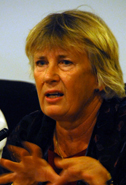 |
| Annelie Evers |
Director, Fojo (Sweden), Ms. Annelie Evers who has been a trainer for 20 years said she is happy to see what SLPI has achieved since it was established and is proud of the partnership between the two organizations in journalism education. “Training of journalists is a must if we are to produce quality journalists,” she said.
Former Head of the Sinhala Department and the Mass Communications Department of the University of Sri Jayewardenepura, Prof. Tissa Kariyawasam gave a background to the emergence of journalism as a subject to be taught at University level in Sri Lanka, and being included in the schools ordinary level curriculum since last year.
Editor of the Irida Lakbima Sundara Nihathamani De Mel said that there is an urgent need to train the trainers. “There is a big difference between knowing a subject and imparting that knowledge to someone else. That needs special training,” he said and called upon the College of Journalism to be more engaged with editors of national newspapers on the needs of the newsroom.
- Rapporteur for the Symposium ; Mr. Lawrence Liang from Unesco.
- The four media organizations, viz., the Newspaper Society of Sri Lanka, The Editors’ Guild of Sri Lanka, Free Media Movement, and the Sri Lanka Working Journalists Association will be studying the recommendations of the Experts Committee in order to revise the 1998 Colombo Declaration on Media Freedom and Social Responsibility.
Opening ceremony: What they said
President Mahinda Rajapaksa in his message to mark the 10th anniversary of the Colombo Declaration on Media Freedom and Social Responsibility reiterated the government’s strong commitment to media freedom and said it appreciates the role played by the media in its responsibilities towards society and the nation.
“We see that in a democratic society, a free, fair and robust media is an important aspect of good governance,” the President said.
He added that it is opportune that media freedom, which is a pillar of democratic society, be studied in depth in the context of the prevailing political, social and economic conditions in Sri Lanka and the world.
Opposition Leader Ranil Wickremesinghe said media organizations in the country need to unite and iron out their differences if they want to preserve what little is left of media freedom in the country today. He said the ‘road map’ of the 1998 Colombo Declaration could be rolled up unless media freedom was safeguarded. “The struggle for media freedom must come from media associations themselves and not from outside,” Mr.Wickremesinghe said addressing the opening ceremony on the occasion of the 10th anniversary events of the Colombo Declaration held at the BMICH on Monday.
The Opposition Leader said that the UNP took steps to abolish criminal defamation in 2002 when it was in power and was on the way to enacting more legislation to enhance media freedom in the country when Parliament was dissolved.
He added that the media should be free to report on the war provided no military strategies are revealed.
JVP Propaganda Secretary Vijitha Herath said the party would work with media associations though it did not agree with them in some instances. “There is a threat to press freedom today and we will stand with you to defend it,” he said adding that ideas must only be defeated by ideas and not by other means.
UNESCO Communication and Information Consultant Alonso Aznar said UNESCO was a facilitator to this international symposium and to that end it has provided the services of recognised specialists for the debates of the conference.
He added that UNESCO would encourage an agreement between the government and the media based on the principles of Article 19 of the Universal Declaration that proclaimed the right to freedom of expression, which included freedom “to seek, receive and impart information and ideas and the International Covenant on Civil and Political Rights” (ICCPR), signed and ratified by the Government of Sri Lanka..
“It is evident that neither the government nor the independent media and media professionals can allow themselves to be in mutual conflict since injustice and the weakening of national institutions are often the result of such a state of affairs and would continue to blur the path of true democracy”.
Founder and Editor-in-Chief of Cobrapost.com and former CEO of Tehelka .Com Aninuddha Bahal said that investigative journalism forms an integral part of the work of journalists and their responsibility to keep the public informed.
“It is the duty of journalists to expose corruption,” he said. |













